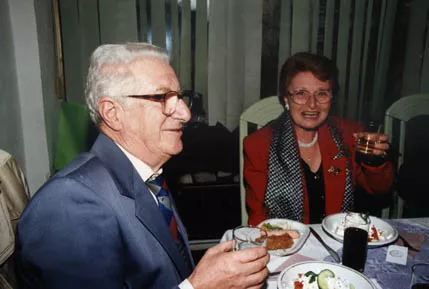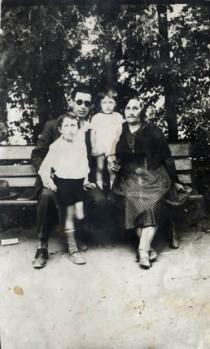Avram Merkado Natan with his second wife Simha Solomon Natan (nee Aladjem) in a restaurant in Sofia
My second wife Simha Solomon Natan (nee Aladjem) and I in a restaurant in Sofia on 26th November 2000.
I did not accept everything before the changes unconditionally, but the things we did - building plants, creating jobs for the people, I think that was something positive. Yet, we also made many mistakes - we imported old technologies, implemented bad economic projects which turned out not to be profitable. We built everything in a hurry. That angered me the most. For example, in Pazardzhik we built a plant for accumulators using an old Czech technology. Also, the plants for heavy machine construction in Chervena Mogila and in Ruse. We live in a small country, which is not rich in resources or in electricity, and yet, we built such enormous plants. Those were mistakes, which we as engineers and technicians in line with the contemporary tendencies in the world noticed. But I did not feel limited in my work and my personal disappointment was of another nature.
Out of the political events in those times I remember Stalin's death [in 1953], which took place while I was working at the site of the bridge over the Danube. There was a Soviet expert monitoring every engineering activity. When they heard about Stalin's death, all the Russians started crying. I was wondering how such responsible and high-level people could cry so easily. But they believed in him! I also thought that Stalin was a great leader, but then I was disappointed by him. In 1958 I was on a business trip to Moscow - we designed a department producing ball-bearings. Nina's uncle, who had been in the USSR since 1918 and was twice sentenced to exile in Siberia, told me how many people were sacrificed - whole groups of emigrants - Germans, Polish, and the Bulgarians were spared only thanks to Georgi Dimitrov, those were his words. I was positive about the April Plenum of the Bulgarian Communist Party in 1956 when Bulgaria similarly to the USSR criticized the distortions of the cult to Stalin's personality and his Bulgarian follower, Valko Chervenkov [the then Bulgarian Communist Party and state leader]. But when Boyan Balgaranov came, who was one of the leading communist figures in Bulgaria, to introduce us to the decisions of the Plenum and when he hit the table with his fist in answer to the criticism of some of the people, I knew that nothing good will come of it.
Nobody harassed me because of my Jewish origin. But I was very angered by the attitude towards the wars in Israel in 1967 and 1973 and the breaking of the diplomatic ties with Israel. That was a policy of the Bulgarian Communist Party, which disappointed me a lot. Because I had been to Israel and I had seen how they worked and how people became real men there. There was no industry in Israel yet, people were building with primitive technologies. Their settlements were green gardens and between them - deserts. People had a lot of enthusiasm. So, I could not accept the idea that they were aggressors. A colleague of mine, Tihomir Stanev, met me at that time, one or two days after the war in 1967 ended. He hugged me, kissed me, and said, 'Avram, I heard that you were wise people, you are a handful of people and you scared so many Arabs.' That was the only man who greeted me warmly, but the propaganda was unpleasant. The other colleagues did not change their attitude towards me. They were very tactful about the war in 1967.





























